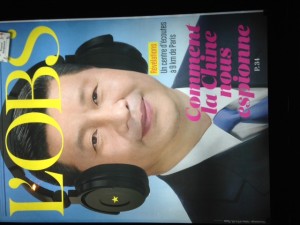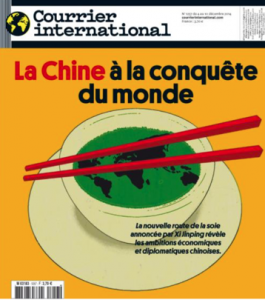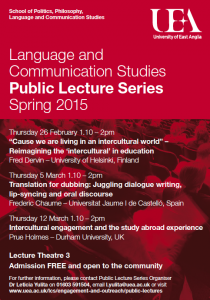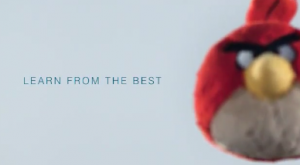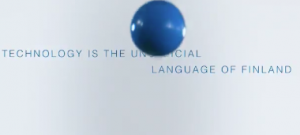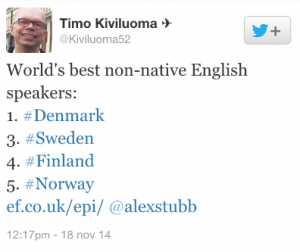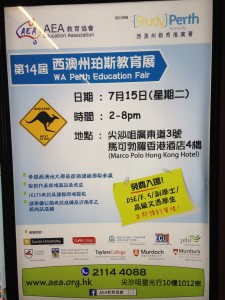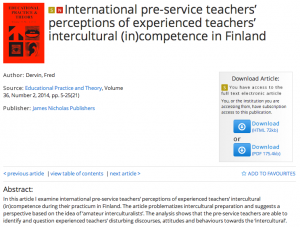Public lecture Spring 2015 Norwich UK
CERCLL Conference 2016
Manipulation of universal understanding of “Human Rights”
From yle News 20.11.2014 about same-sex marriage
(Finland is still one of the last countries in Europe not to have approved the law…)
“Interior Minister and Christian Democratic chair Päivi Räsänen meanwhile said in a radio interview yesterday that her opposition to marriage equality is based on the UN’s 1948 Declaration of Human Rights.
“If we think about the UN declaration, which is significant from the perspective of a universal understanding of human rights, it says that everyone has the right … every man and woman has the right to marriage, in other words it defines marriage as a union between a man and a woman,” Räsänen said on Radio Helsinki’s programme “Tasavalta” (The Republic).
Räsänen maintained that the definition of marriage as a union between a man and woman was not her own interpretation of the Declaration, but said that it constituted the objective meaning of the text.
“Well I say that this is interpretation is precisely what is meant. Otherwise it would have said that an adult person has the right to marriage. In other words it talks specifically about men and women, who have the right to marry. I am fully convinced that this is what is meant here,” she insisted”.
Article 16.1 of the Universal Declaration of Human rights states:
“Men and women of full age, without any limitation due to race, nationality or religion, have the right to marry and to found a family. They are entitled to equal rights as to marriage, during marriage and at its dissolution.”
Finnish nation branding and propaganda
Some more ‘ethnocentric’ jewels about Finland.
Watch this video.
From another source, a ridiculous study about the World’s best non-native English speakers…
Finally an interesting video in Chinese about the University of Helsinki (click on pix):
New article (popularization)
Special Issue on Chinese Students – accessible until mid-Dec. for free
My publisher is offering free access to a special issue of the journal Frontiers of Education that I have edited. The issue focuses on Chinese Students and Scholars in the Global Community: Challenges of Integration in the contexts of Australia, Denmark, Finland, Malaysia, New Zealand, and Singapore.
We invite you to read our articles and take advantage of the free trial access until Dec 7th 2014.
Feel free to download and save the articles onto your computer or mobile device.
Chinese Students and Scholars in the Global Community: Challenges of Integration written by Fred DERVIN, please visit:http://journal.hep.com.cn/fed/EN/10.3868/s110-003-014-0027-x#1
Being Chinese or Being Different: Chinese Undergraduates’ Use of Discourses of Chineseness written by Gillian SKYRME, please visit:http://journal.hep.com.cn/fed/EN/abstract/abstract11302.shtml
Taiwanese Students in Malaysia and Interculturality: When National Identities Take Primacy over Individualities written by Regis MACHART et al., please visit: http://journal.hep.com.cn/fed/EN/abstract/abstract11303.shtml
Privilege, Prejudice, Predicament: “PRC Scholars” in Singapore—An Overview written by Peidong YANG, please visit:http://journal.hep.com.cn/fed/EN/abstract/abstract11304.shtml
Enhancing Overseas Chinese Graduate Employability: The Case of Chinese Graduates with Finnish Academic Qualifications written by Yuzhuo CAI, please visit: http://journal.hep.com.cn/fed/EN/abstract/abstract11305.shtml
Educating Teachers of “Chinese as a Local/Global Language”: Teaching “Chinese with Australian Characteristics” written by Michael SINGH and Jinghe HAN, please visit: http://journal.hep.com.cn/fed/EN/abstract/abstract11306.shtml
Chinese Teachers’ Professional Identity and Beliefs about the Teacher-Student Relationship in an Intercultural Context written by LiWANG and Xiangyun DU, please visit: http://journal.hep.com.cn/fed/EN/10.3868/s110-003-014-0033-x
About the Northern Future Forum 2014…
Stubb (Finland’s PM) organised the Northern Future Forum at Aalto University last week. Special guest: D. Cameron…
“The prime ministers of the UK, the Nordic countries and the Baltic states will convene with the aim of sharing ideas and finding new ways of tackling the common challenges encountered in the modern northern European economies.
The Northern Future Forum (NFF) is a unique event that brings together the prime ministers, business leaders, entrepreneurs and policy makers from nine northern European countries. The discussion at NFF 2014 will focus on how to foster equality, wellbeing and competitiveness under the current economic challenges. The meeting will also include presentations and discussions on policies, ideas and innovations that have helped create jobs and improve the standard of living in the participating countries” (description on website).
No comment about the omnipresent empty discourses on ‘innovation’ but also ‘competition’ (in relation to education!) and the showing off.
The following comment from Cameron at the end made me winch:
“finally for me I think we are very rational northern Europeans we come together and we talk about our problems some of the difficulties that we have I think we should also celebrate our successes and I think that one of the successes that we should celebrate is the fact that I profoundly believe that societies like ours that are open democratic and liberal and tolerant and disputatious and argunentative we are more creative and more inventive than closed societies whether in China or in Russia or elsewhere and I think we should celebrate that one of the best ways to keep ahead and to be creative and to be recognised as the sort of societies we are and the sort of creativity we achieve we often talk about our problems but let’s also pick up the values that we have which are very important part of our prosperity now and in the future“.
An excellent example of Northern-centric discourse… More creative and inventive than… China?
Link to the videos HERE
New article
CFC Education for Sale: The New Faces of Educational Colonialism
Call for Chapters
Education for Sale: The New Faces of Educational Colonialism
Eds. Monika Schatz (University of Helsinki, Finland), Ana Popovic (University of Nis, Serbia) &
Fred Dervin (University of Helsinki, Finland)
Deadline for abstract submission: 10th December 2014
Education has always been international volens nolens. No system of education is purely ‘national’ or Chinese, Icelandic, Moroccan, Spanish, etc. All countries have constructed their educational ideals, practices and values, by borrowing ‘bits and pieces’ from other countries, often beyond recognition. The mobility of students, teachers and scholars since the beginning of times has allowed people to do just that.
Our times, symbolized by the ‘accelerated’ internationalization of education, do not differ in that sense. Of course speed and complexity characterize the mixing, interaction and cooperation between countries. But the internationalization of education is not merely an outcome of globalization and increased academic mobility. With the introduction of international rankings and accreditation policies in the 1960s, and their current ‘explosion’, education has undoubtedly turned into ‘big business’ and allowed countries to struggle against each other in the jungle of the global education market. For most higher education institutions internationalization has become a necessary strategic tool to compete for funding, visibility and recognition, but also to attract staff and students. As a result, the marketing and franchising of education have become common practices all over the world. Education is thus increasingly understood as a commodity, and more and more regarded as a national and supranational asset. For example in countries like Australia, Finland, the UK and the USA but also in world regions such as the European Union, the export of education (including attracting international students) is a crucial part of national economies. That is why these countries have been active in branding their national education and its global dissemination.
But what often remains unquestioned is the ethical dimensions behind the marketization and branding practices of education. Who is entitled to claim ‘good’ versus ‘bad’, ‘modern’ versus ‘out-of-date’ educational practices? Is it true that international education export business puts non-Western countries under tutelage of an educated elite? This volume asks this sensitive yet central question: Are we witnessing new forms of educational colonialism?
This call for chapters is interested in new, original and critical approaches towards the business of selling education internationally. All levels of education are concerned. The volume aims to deliver fresh perspectives by combining international and interdisciplinary contributions. Diachronic studies on any aspect of education export are also welcome. The editors are especially interested in the following questions (amongst others):
Who dictates the export of education, how and why?
Should nations and education be branded in order to increase their competitiveness?
How does the education export sector affect the global positioning of nations? Who benefits from it? Who is disadvantaged and why? Who are the actors involved?
Does selling education abroad always lead to new forms of colonialism?
What are good/bad practices when it comes to the marketing and selling of education?
How ethical is the international education market? For what purposes should education be sold?
What are the consequences of marketing education for multi-cultural/intercultural communication and encounters and relations?
What is the impact of education branding on local education?
Does selling national education have a future?
Potential authors are invited to submit a 300‐word proposal (including a few lines about the author(s)) in English to the editors by Dec. 10th 2014 (e‐mail: educationforsale2015@gmail.com; IMPORTANT: .rtf or .doc files only). The proposals should clearly explain the originality of the approach to the commodification and internationalization of education, and include a short description of empirical data (where applicable). A basic bibliography may also be added. Authors of accepted proposals will be notified by Dec. 15th 2014.
The book is scheduled to be published in 2015 with Palgrave. All submitted chapters will be reviewed on a blind review basis.

